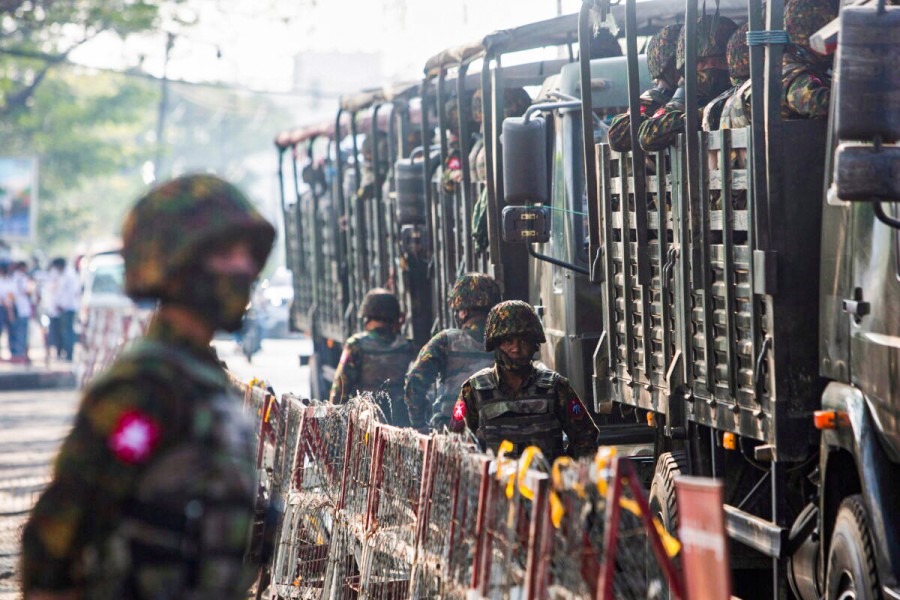Myanmar’s military junta said on Monday it had executed four democracy activists accused of helping carry out “terrorist acts” in the Southeast Asian country’s first executions in decades, drawing widespread condemnation.
The four men were sentenced to death in January in a closed trial and accused of helping militias fight the army that seized power in a coup last year and launched a bloody crackdown on its opponents.
Myanmar’s Government of National Unity, a shadow administration banned by the ruling military junta, has condemned the executions and called for international action against the Myanmar military junta.
“Very sad… to condemn the brutality of the military junta…,” Kyaw Zaw, a spokesman for the university’s president’s office, told Reuters in a message. “The global community must punish their cruelty.”
Among those executed were Democratic figure Kyaw Min Yew, better known as Jimmy, and former lawmaker and hip-hop artist Phyo Zia Tho, said the Global New Light of Myanmar.
Kyaw Min Yew, 53, and Phew Zia Tho, an ally of ousted Myanmar leader Aung San Suu Kyi, lost their appeals against the verdicts in June. The other two executed were Hla Myo Aung and Ong Thura Zaw.
“I am outraged and appalled by the news of the execution of Myanmar’s patriots and champions of human rights and democracy,” Tom Andrews, the UN Special Rapporteur on human rights in Myanmar, said in a statement.
“My heart goes out to their families, friends, loved ones, and indeed all the people in Myanmar who have fallen victim to the atrocities of the escalating military junta… These corrupt actions should be a turning point for the international community.”
Thazin Nyunt Aung, wife of Phew Zyar Tho, said she was not informed of her husband’s execution. Other relatives could not immediately be reached for comment.
The men were being held at the colonial-era Insein prison, and a person familiar with the events said their families visited the prison last Friday. The person said that only one relative was allowed to speak to detainees via the online platform Zoom.
On Monday, Myanmar state media reported that executions had been carried out, and military council spokesman Zaw Min Tun later confirmed the executions for the Voice of Myanmar. He did not give any details of when the executions took place.
Previous executions in Myanmar were carried out by hanging.
An activist group, the Association for the Assistance of Political Prisoners (AAPP), said the last judicial executions in Myanmar were in the late 1980s.
International condemnation
Military junta spokesman Zaw Min Tun last month defended the death penalty, saying it is justified and used in many countries.
“At least 50 innocent civilians, except for the security forces, died because of them,” he said in a televised news conference.
“How can you say this is not fair?” Asked. “The required actions must be taken at the required moments.”
Cambodian Prime Minister Hun Sen, the president of the Association of Southeast Asian Nations (ASEAN), in a letter in June appealed to junta leader Min Aung Hlaing not to carry out the executions, conveying deep concern among Myanmar’s neighbours.
Myanmar’s ruling military junta denounced foreign statements about the execution orders as “reckless and meddling”.
Myanmar has been in chaos since a coup last year, with conflict spreading across the country after the military crushed mostly peaceful protests in cities.
“These horrific executions were murders. They are part of the junta’s ongoing crimes against humanity and attacks on the civilian population,” Matthew Smith, head of Fortify Rights in Southeast Asia, told Reuters.
“The Military Council would be completely wrong in thinking that this would instill fear in the hearts of the revolution.”
The association says more than 2,100 people have been killed by security forces since the coup. The military council says this number is exaggerated.
It is difficult to assess the true picture of the violence as the clashes have spread to remote areas where ethnic minority rebel groups are also fighting the army.
Last Friday, the international court rejected Myanmar’s objections to a genocide case over its treatment of the Rohingya Muslim minority, paving the way for the case to be heard in full.
Myanmar analyst Richard Horsey, of the international group CRISIS, said the recent executions are eliminating any chance of ending the turmoil in the country.
“Any possibility of dialogue to end the crisis created by the coup is now removed,” Horsey told Reuters.
“This is the system that proves that it will do as it pleases and will not listen to anyone. It sees this as a sign of strength, but it could be a serious miscalculation.”
Human Rights Watch’s acting director for Asia, Elaine Pearson, said the executions were aimed at calming the anti-coup protest movement.
“The member states of the European Union, the United States and other governments should show the junta that there will be accountability for its crimes,” Pearson said.
“They should demand immediate action, including the release of all political prisoners, and inform the Military Council of the atrocities it is committing that have consequences.”


